☆ PuniPuni Youtube ☆
Japanese Grammar: Expressing Desire in Japanese Part 2 – Review Notes
Last time, we learned how to say I want (something) in Japanese. Today we will learn how to say I want to do (something) in Japanese! (◕ω<)☆
………………………………………………………………………………..
Two ways to Express Desire in Japanese
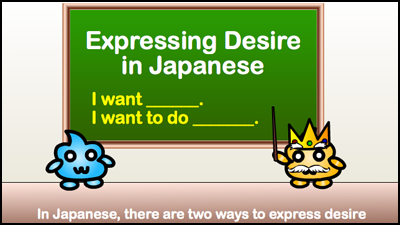
★ As we learned last time, there are two ways to express desire in Japanese!
★ Last time we learned how to say I want ___ which is used only with nouns (objects)! If you missed our last grammar lesson, click here!
★ Today we will learn how to say I want to do ___ which is used with verbs (actions)!
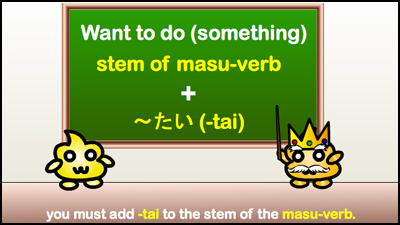
★ When you want to say that you want to do something (action/verb) you must add 〜たい (tai) to the stem of the masu-verb.
★ To get the stem of a masu-verb, just take off ます (masu).
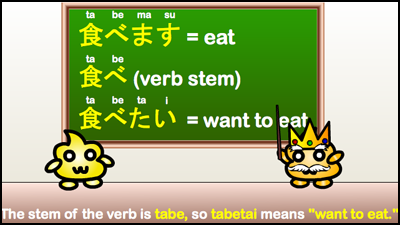
★ For example, the stem of the verb 食べます (tabemasu) – to eat – is 食べ (tabe).
★ If you add たい (tai) to the verb stem, you get 食べたい (tabetai) – want to eat.
………………………………………………………………………………..
Examples:

ケーキが食べたいです。
Kēki ga tabetai desu.
I want to eat cake.

日本に行きたいです。
Nihon ni ikitai desu.
I want to go to Japan.
………………………………………………………………………………..
Talking About Other People’s Desires
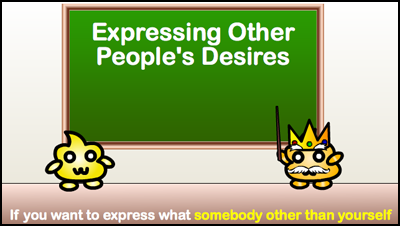
★ Just like we learned last time with ほしい (hoshii), if you want to express somebody else’s desires, you have to say it differently.
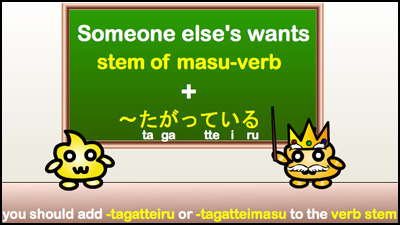
★ Instead of adding 〜たい (tai) to the verb stem, you must add たがっている (tagatteiru) or the more formal version たがっています (tagatteimasu) to the verb stem.
★ The reason is because only oneself can ever really know what he/she really wants. Adding -gatteiru adds a layer of uncertainty and is therefore used when talking about someone else’s wants.
………………………………………………………………………………..
Examples:

彼はケーキを食べたがっています。
Kare wa kēki o tabetagatteimasu.
He wants to eat cake.

彼女は日本に行きたがっています。
Kanojo wa nihon ni ikitagatteimasu.
She wants to go to Japan.
.………………………………………………………………………………..
A few words on Particles
★ When using 〜たい (tai) in a sentence, the direct object marker を (o) can be replaced with the subject marker が (ga).
★ For example, the two sentences below mean the same thing.
.………………………………………………………………………………..
Using direct object marker を (o):
.………………………………………………………………………………..
ジュースを飲みたいです。
Jūsu o nomitai desu.
I want to drink juice.
.………………………………………………………………………………..
Using subject marker が (ga):
.………………………………………………………………………………..
ジュースが飲みたいです。
Jūsu ga nomitai desu.
I want to drink juice.
.………………………………………………………………………………..
★ When using たがっています (tagatteimasu) in a sentence, the direct object particle を (o) can not be replaced with が (ga).
★ Other particles are used as normal. For example, in the sentence 日本に行きたいです (nihon ni ikitai desu) – I want to go to Japan – the direction particle ni is used.
.………………………………………………………………………………..
Other forms; conjugations of 〜たい
★ If you want to change to past tense or negative, たい (tai) is conjugated just like an i-adjective. Here is a quick reference to some of the conjugations using the example 食べたい (want to eat):
Past Affirmative: wanted to eat
食べたかった (tabetakatta)
Present Negative: don’t want to eat
食べたくない (tabetakunai)
Past Negative: didn’t want to eat
食べたくなかった (tabetakunakatta)
.………………………………………………………………………………..
☆Additional Example Sentences☆
.………………………………………………………………………………..
今日は早く寝たいです。
Kyō wa hayaku netai desu.
I want to go to sleep early today.
.………………………………………………………………………………..
日本語を勉強したいです。
Nihongo o benkyō shitai desu.
I want to study Japanese.
.………………………………………………………………………………..
買い物に行きたいです。
Kaimono ni ikitai desu.
I want to go shopping.
.………………………………………………………………………………..
映画を見たいです。
Eiga o mitai desu.
I want to watch a movie.
…………………………………………………………………………………
Conclusion:
Today we learned how to say I want to do (something) in Japanese!
If you still didn’t see our last grammar lesson, click here to learn how to express desire for an object in Japanese! (◕ω◕)♪
………………………………………………………………………………..
Get Japanese dictionary!
Do you want to know a lot of Japanese words? I recommend you to get a dictionary!
If you have dictionary, you can always look up new Japanese words\(◕ω◕)/♥
………………………………………………………………………………..
Do you want a Japanese tutor?
Take Japanese Skype Lessons with Professional Japanese Teachers on kakehashijapan.com!
………………………………………………………………………………..
………………………………………………………………………………..












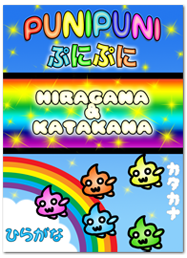
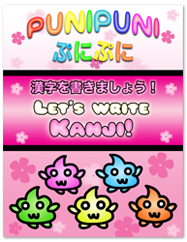


8 comments
Thank you, this post is the best answer for my former question 😀
Comment by Kamirun on 04/26/2013 at 2:33 pmどういたしまして!\(◕ω<)/♥ You're welcome! Glad we could help☆
Comment by PuniPuni on 04/26/2013 at 3:32 pmKonnichiwa gosaimasu :3
How would one say negatives, I.e I don’t want to eat cake, or he doesn’t want to eat cake.
Arigato 😀
Comment by anton on 11/13/2013 at 3:58 pmKonnichiwa! We included the way to make negatives (see the section “Other forms; conjugations of 〜たい”) but you can say ケーキを食べたくないです。(kēki o tabetakunai desu.) – (I) don’t want to eat cake. Basically, just take off い (i) and add くない (kunai) (◕ω◕)☆
Comment by PuniPuni on 11/14/2013 at 7:00 amYou stated that the sentence “ke-ki o tabeta kunai desu.” means I don’t want to eat cake….
Comment by vibez on 06/18/2014 at 2:17 amhow do you say it if my sentence is “HE didn’t want to eat cake”…how can you conjugate it into
the TAGATTEIMASU pattern which you discussed in this topic stating someone else’s desire?????
You can say “~tagatteimasen deshita” for “(he) didn’t want to~” but it is actually more common to simply use “~takunakatta desu” for the third person as well. So, you could say 彼はケーキを食べたくなかったです。(kare wa kēki o tabetakunakatta desu.) – He didn’t want to eat cake.
Comment by PuniPuni on 06/21/2014 at 6:40 amwwoooowwwww…thank you so much for your explanation…. you really did a good job… ahm, by the way… can you have some lessons about keigo please??? I would really appreciate it…
Comment by vibez on 06/22/2014 at 10:55 pmHow would you say, “I don’t want that book”?
Comment by Kairu on 10/22/2014 at 1:14 amWould hoshii be like any other -i adjective?
So “Ano hon ga hoshikunai desu”? For third person would it be”Ano hon ga hoshigatteikunai desu”?